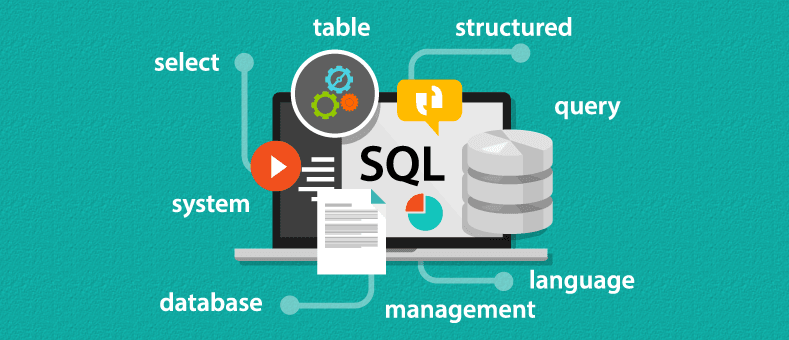4 min to read
Most Common SQL Questions & Answers You Must Know For Your Next Interview
Here, SQL also known as ‘Structured Query Language is a computer language that fetches as well as manages information stored in any database. Hence, Programmers well versed in this language are offered fruitful jobs. And the competition to secure these jobs is quite raging. Therefore, whether you are a fresher or an experienced professional, here are a few essential questions you should go through in order to succeed in your next interview. SQL Questions & Answers for Your Next Interview 1.

Here, SQL also known as ‘Structured Query Language is a computer language that fetches as well as manages information stored in any database.
Hence, Programmers well versed in this language are offered fruitful jobs.
And the competition to secure these jobs is quite raging.
Therefore, whether you are a fresher or an experienced professional, here are a few essential questions you should go through in order to succeed in your next interview.
SQL Questions & Answers for Your Next Interview
1. What is SQL?
Furthermore, SQL is a computer programming language that you can use in order to retrieve, update, manipulate, manage as well as store the information you have stored in a database.
2. What are the subsets of SQL?
Here, There are three types of subsets of SQL:
- A Data Definition Language- including operations like CREATE, ALTER, and DELETE.
- Data Manipulation Language- offers access as well as manipulation.
- Data Control Language- offers access control of the data.
3. What is DBMS?
Here, DBMS also known as the Database Management System is software that offers interaction between you as well as the database in order to collect as well as analyze data.
4. What are the different types of DBMS?
There are two types of DBMS:
Relational Database Management System
Non-Relational Database Management System
5. What do you understand by tables as well as rows in SQL?
In addition, a relational database system contains one or more objects called tables.
Hence, The data or information for the database is stored in these tables. Tables are uniquely identified by their names as well as are comprised of columns as well as rows. Columns contain the column name, data type, as well as any other attributes for the column.
6. What do you understand by a JOIN Clause?
Here, You can use the JOIN clause to merge data when the data in the rows of a table are related by one or more common tables.
JOIN Clause is of four types:
- inner,
- right,
- left as well as,
- full
7. What do you mean by DISTINCT Statement as well as how is it used?
Hence, in case your records contain duplicate values, The DISTINCT statement is a SELECT command you can use to choose specific values among those duplicates.
8. List all the clauses which are used in SQL?
Clauses are commands in the SQL software.
There are 6 main types of clauses:
- WHERE
- ORDER BY
- GROUP BY
- HAVING
- JOIN
- USING
9. What do you mean by CONSTRAINTS? What are its types?
Here, are commands you can use to set the rules for your data. Any operations violating the set rules are aborted by the constraints.
There are five types of constraints:
- NOT NULL- columns cannot be left empty or null
- UNIQUE – ensures values in cells are unique as well as not repeated
- PRIMARY KEY – to identify a record
- FOREIGN KEY – ensures the integrity of data
- CHECK – makes certain values in cells meet the set rules.
10. What are Scalar Functions?
You can use the Scalar Function to return a single value for the input value.
They are:
- UCASE ()
- LCASE ()
- MID ()
- FORMAT ()
- LEN ()
- ROUND ()
11. What is a view as well as how can it be updated?
It is a simulated table containing your information from the fields of one or more different tables.
To update the view of the commands you can use CREATE as well as REPLACE.
12. What is Injection?
You can use this technique to access sensitive data where a malicious command is entered into an entry field in order to open a certain database to the attacker.
13. What is Subquery?
A query whose output serves as input for another query is called a subquery.
14. What is the difference between SQL as well as MYSQL?

SQL is involved in the creation as well as access of your databases, whereas MySQL is a Relational DBMS that uses SQL as the standard language.
15. What is data integrity?
The authenticity , as well as consistency of data in your database, is called its integrity.
16. What are clustered as well as non-clustered indexes?
They are performance-tuning methods.
The clustered index offers easy as well as quick retrieval as well as it alters the way your data is stored in rows as well as columns, sorting it out.
A non-clustered index is comparatively slower to use as well as it does not affect your data storage.
17. What are DE normalization as well as Normalization?
DE normalization is a technique you can use to better the performance through the introduction of redundancy into a table.
Normalization is a data organization technique that helps avoid any duplication as well as redundancy.
18. What is ACID property?
It stands for Atomicity, Consistency, Isolation, as well as Durability.
It ensures the reliability of your data transactions.
19. What is a Trigger?
It is a procedure that automatically executes in wake of data modifications.
20. What are the operators?
They are commands in the language.
They are:
- Arithmetic
- Comparison
- Logical
21. What is DROP, DELETE as well as TRUNCATE?
They are commands you can use to modify your data.
- DROP irreversibly removes the entire table from your database.
- DELETE removes a single row from your table.
- TRUNCATE removes all rows from your table.
If you want to hire or start any project with good freelancers, click here
FAQ
Q1. What are the limitations of MySQL Database?
Ans- The internal representation of a MySQL table has a maximum row size limit of 65,535 bytes, even if the storage engine is capable of supporting larger rows. BLOB and TEXT columns only contribute 9 to 12 bytes toward the row size limit because their contents are stored separately from the rest of the row.
Q2. Can MySQL handle big data?
Ans- MySQL was not designed for running complicated queries against massive data volumes which requires crunching through a lot of data on a huge scale. MySQL optimizer is quite limited, executing a single query at a time using a single thread.
🚀 Try Codersera Free for 7 Days
Connect with top remote developers instantly. No commitment, no risk.
Tags
Trending Blogs
Discover our most popular articles and guides
10 Best Emulators Without VT and Graphics Card: A Complete Guide for Low-End PCs
Running Android emulators on low-end PCs—especially those without Virtualization Technology (VT) or a dedicated graphics card—can be a challenge. Many popular emulators rely on hardware acceleration and virtualization to deliver smooth performance.
Android Emulator Online Browser Free
The demand for Android emulation has soared as users and developers seek flexible ways to run Android apps and games without a physical device. Online Android emulators, accessible directly through a web browser.
Free iPhone Emulators Online: A Comprehensive Guide
Discover the best free iPhone emulators that work online without downloads. Test iOS apps and games directly in your browser.
10 Best Android Emulators for PC Without Virtualization Technology (VT)
Top Android emulators optimized for gaming performance. Run mobile games smoothly on PC with these powerful emulators.
Gemma 3 vs Qwen 3: In-Depth Comparison of Two Leading Open-Source LLMs
The rapid evolution of large language models (LLMs) has brought forth a new generation of open-source AI models that are more powerful, efficient, and versatile than ever.
ApkOnline: The Android Online Emulator
ApkOnline is a cloud-based Android emulator that allows users to run Android apps and APK files directly from their web browsers, eliminating the need for physical devices or complex software installations.
Best Free Online Android Emulators
Choosing the right Android emulator can transform your experience—whether you're a gamer, developer, or just want to run your favorite mobile apps on a bigger screen.
Gemma 3 vs Qwen 3: In-Depth Comparison of Two Leading Open-Source LLMs
The rapid evolution of large language models (LLMs) has brought forth a new generation of open-source AI models that are more powerful, efficient, and versatile than ever.